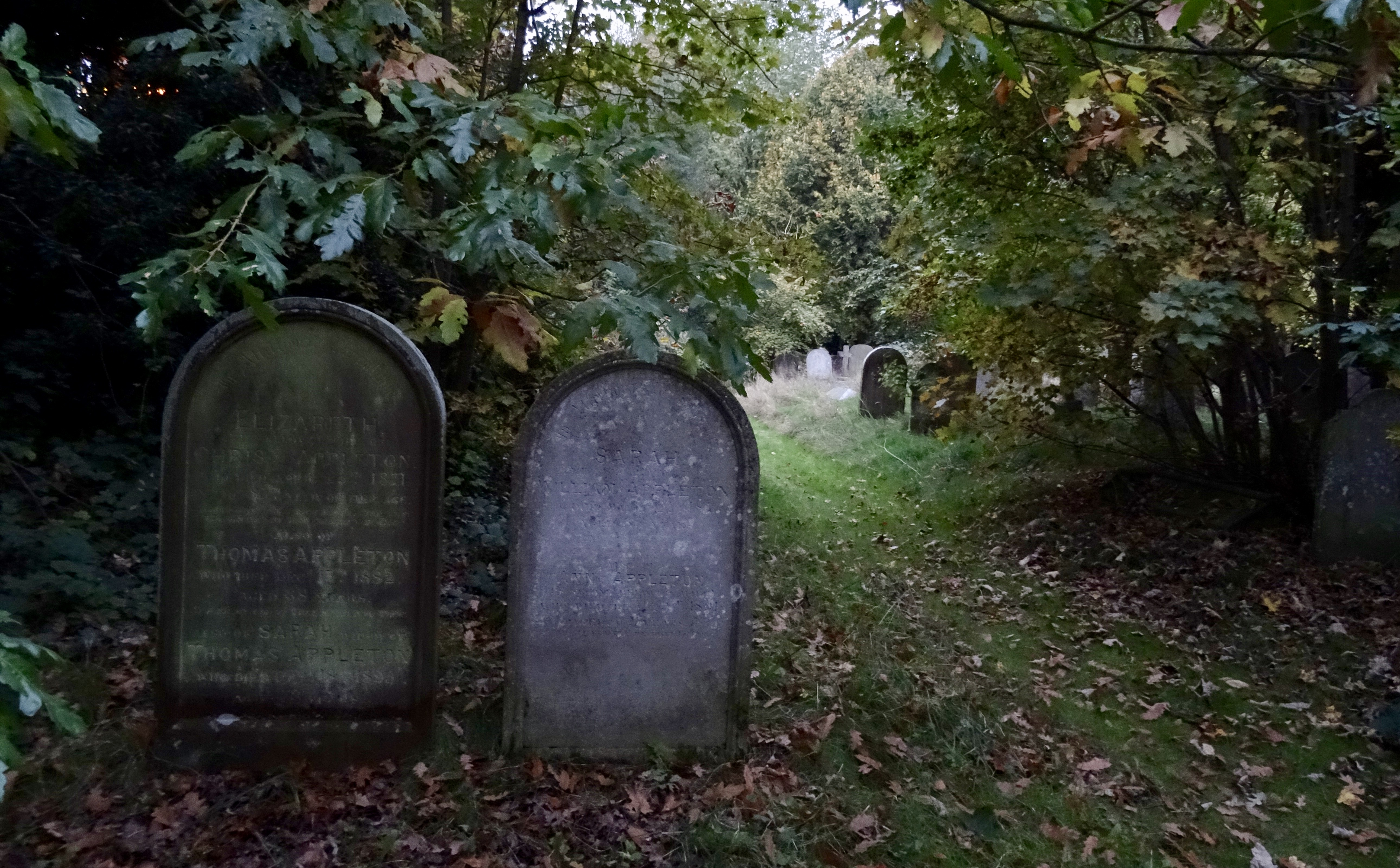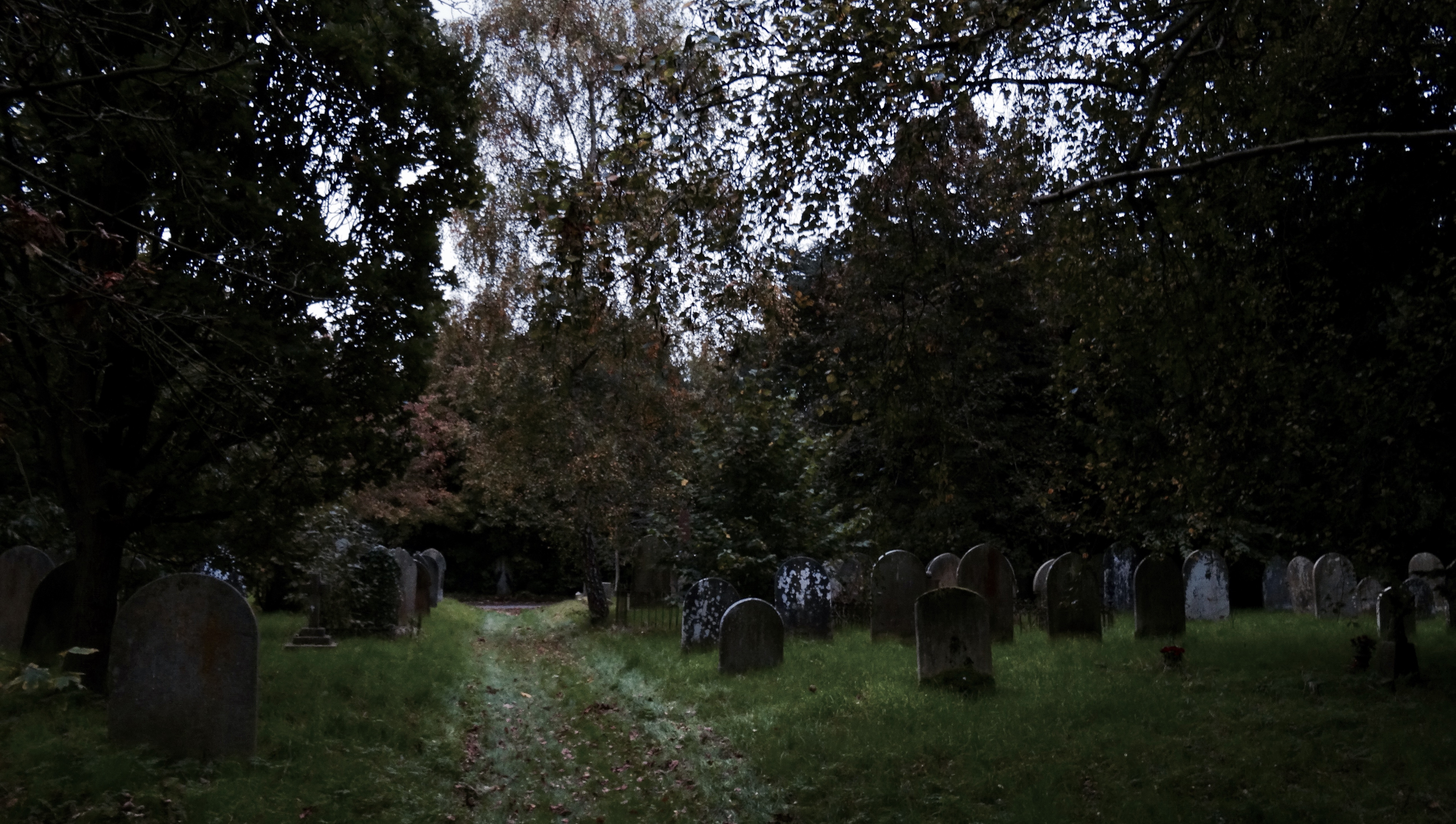Burials

I’ve been thinking about graveyards.
Not just because it’s Halloween—and my birthday, incidentally.
I’m thinking about graveyards because I’ve recently moved from Montreal to Norwich, England, and my partner and I rent a little row house (the estate agents call them terraced houses here, and ours is also an over-the-passage) directly across the street from a rambling, overgrown cemetery. I cut through it every day when I need a break from my desk, or when I go to buy stamps at the post office, or groceries up on Earlham Road, or if I want to take the pretty way into town.
The cemetery’s gravestones date back to the early nineteenth century. As often as not, they lean precariously forward or backwards, cracked, and scabbed over in fluorescent chartreuse lichen. The ground is thick and bumpy with broken acorns. Even now, in fall, the grass is a rich green. Squirrels dive-bomb and hop and jump from graves to grass with glee, and birds I can’t yet name because I don’t know English birds—pigeons more delicate than pigeons and various jays—flit and eat their fill peacefully.
The cemetery is in use; there’s a funeral in process almost every time I cut through. It’s in use in other, more mundane ways, too, mostly as a sort of public park. Sometimes I play a game with myself when I catch sight of someone in a long, black robe: priest or goth? So far the odds are even—I’ve seen both in equal measure.
Aside from the old, crooked stones, there are more recent gravesites. One, for someone named “Joshy,” is sad to see. Though Joshy’s parents have evidently done their utmost to make the grave a colourful, happy place, the very time and attention bestowed upon the grave, as well as that child’s monicker, vibrate with a sense of loss and tragedy. I think of the family each time I round the bend, past their memorial, and over to the main road.

I’m also thinking about graveyards because I just buried my father’s ashes a couple of weekends ago. Impossible to think of his large frame, his enormous self, fitting into the tiny pine box we put into the ground. I buried him in a cemetery outside of Toronto where his parents and grandparents are also buried. Somehow it was reassuring to see all those people with my last name, our last name, Bull, grouped together, dating back all the way to the 1800s. Time dividing and reuniting.
I buried my father with the cross he’d always hung over his front door. A plain, square, pine cross. Spartan. Spare. My father said he preferred the empty cross, the sign of the resurrection, to the crucifix. A value strongly inculcated into his vein of Scots-Irish Protestantism. One time, at my grandmother’s cottage, I was scared of ghosts and nightmares; he clipped my barrettes into the shape of the cross and told me that God was always with me. Afterwards, I was able to fall asleep.
At the burial, I’d asked my cousins and aunts and uncles to say something they remembered about my dad. The stories they shared ranged from my father chatting up a premier to his work with the homeless to his exaggerated telling of the time I saw Castro. (He told my cousin I’d gone to Trudeau’s funeral and sat next to Castro because I’d confused him for my father, when in fact I’d stood outside the gates with the crowds at Trudeau’s funeral and watched Castro walk by me.) The gravedigger laughed with us, and my father would have liked that, his own gravedigger laughing about us catching my father out in a “story," and liked him just on his own terms. Everyone said it: my father had the ability to meet people where they were. A good quality in a journalist. A great human quality.
My father died without a will. It was a huge struggle to get power of attorney while he was dying of brain cancer. Ultimately, I wasn’t able to, not in time, and a lot of things fell apart before and after his death—he was in debt, it was a mess—that made my own life complicated and hard.
My own mortality is on my mind in a kind of bureaucratic, mundane way. I’ve told my partner that he and I need to make up wills for ourselves this year. I can’t leave things the way my father did.
There’s a kind of unidirectional feeling with this new time in our lives. Because of what moving our lives across the ocean entails and because we’re seriously considering not having children. Not having children means more time stretching in front of us, more freedom. Because it’s my birthday, and because I’m turning 39, putting off childbearing again now means I’m crossing a line. There isn’t that maybe someday cushion anymore. And I’m thinking about letting a life full of half-dreamed dreams (lists of names, imagining myself pregnant, seeing a kid with my partner’s big, blue eyes) die.
Who will bury me? It’s both completely normal and absolutely absurd to imagine my needing to be buried. Of course I don’t need to have children in order to have my remains disposed of. Family is more than offspring. And considering who might survive me is unpleasant and a waste of time and I don’t want to dwell on it. But still. It’s weird.
I don’t know if my partner and I will make our lives here, in Norwich. If we’re here for a time or for the rest of the time we have. But I can imagine being buried here. Among these people with their long and short lifespans announced all around by their loved ones. With their old-fashioned names—Violet, Millie. With the squirrels and the jays and the— maybe they’re turtle doves—between the hospital and the grocery stores.
The older graves are overgrown, a tangle of wildflowers and broken branches. They’re my favourites. Sometimes young people have picnics there, and sometimes they string garlands around headstones in show, or in remembrance, or as performance art. It’s meaningless, ultimately. But nice.





